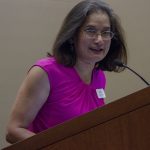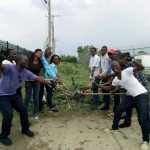For the second consecutive summer, from June 16 to July 30, the Staley School of Leadership Studies hosted the Mandela Washington for Young African Leaders, a flagship program of President Obama’s Young African Leaders Initiative (YALI), which empowers young people through academic coursework, leadership training, and networking. The cohort of Fellows hosted this year, a group of 25 bright and emerging young civic leaders from Sub-Sahara Africa, were part of a larger group of 1,000 Mandela Washington Fellows hosted at institutions across the United States this summer. The Fellows took part in a six-week Civic Leadership Institute throughout which the Staley School facilitated opportunities for cultural exchange and leadership development to advance the work of each Fellow by growing their capacity to lead change upon return to their home countries.
YALI 2017 at K-State came to an end with celebration and graduation ceremony on Saturday July 29, 2017. On this day, our 2017 Mandela Fellows received a certificate from Dr. Mary Hale Tolar, Director of the School, and Dr. Brandon Kliewer, professor of civic leadership, in acknowledgement of their completion of the 2017 Institute at Staley School. Also, the Fellows received a certificate of appreciation from the the City of Manhattan.

We are particularly proud of these young Africans leaders, and we are excited for the bright future ahead of them as they are now ambassadors of our big Wildcat family in their respective countries.
Let’s take you back to memorable moments spent with the Fellows during their six-weeks civic leadership institute…
Week one began with the first module of the civic leadership institute. During this module, Fellows focused on getting to know themselves as leaders and as community members, and built a learning community. Following the public narrative framework of Marshall Ganz, Fellows developed a community of practice building their stories of self, us, and now and reflect on that process. This module also invited them to define, shape, and realize the type of learning community necessary for civic leadership learning and development. Essential functions and operations of the Civic Leadership Institute were discussed, as well as discussion about creating inclusive, equitable spaces to support mutual learning and development. During this week, the fellows were introduced to the Manhattan community, they rediscover themselves through the StrengthQuest assessment, and they began to learn more about the story of the little apple, their home for six weeks, through guided tour of some iconic places in town such as the Konza, and the Flint Hills Discovery Center.
The Fellows dove into further cultural experiences during the second module of the civic institute in week two. They had an opportunity to introduce their culture to the public of Manhattan during Africulture. Also, they got introduced to origins of the U.S. democracy during their tour of the city of Manhattan offices, the Browns v. Board of education historical site, and the Equality House, a LGBTQ resource and advocacy center in Topeka, KS. In this context, the fellows considered leadership practices related to, and associated with Myers-Brigg Personality Types, design thinking, and Visual Thinking Strategies (VTS). In the classroom, visiting faculty from Kenya, Paul Maina, founder and Director of the Children and Youth Empowerment Centre in Nyeri, Kenya, also the 2012 Michael C. Holen Leader-in-Residence award recipient at Kansas State University Staley School of Leadership, facilitated a session about culture and context. The fellows also Analyzed and contrast the concepts of lived and espoused values and processes of American Democracy and civic leadership.
Module three in week three of the civic leadership institute invited the fellows to consider the relationship between civic leadership activity and political action in the United States. Sessions in this module offer opportunities for the fellows to increase their knowledge in civic strategy, political actions, and mobilizing others. In this context, the fellows participated in community service with Habitat for Humanity Restore, they visited the Presidential Library of Dwight D. Eisenhower and completed a basic facilitation training conducted by the Institute for Civic Discourse and Democracy, and participated in a discussion with former and current Kansas State elected officials about “eggs and issues”. These experiences aimed to highlight how civic action requires leadership capacities and dispositions in response to forms of political contestation. During their session with visiting faculty from Kenya, Jackline Oluoch Aridi, the fellows had a leadership lesson from the field. Aridi is the Ford Program’s East Africa regional program coordinator. She has also worked with the International Center for AIDS Care and Treatment Programs at Columbia University, the World Health Organization, the Guttmacher Institute, GBCHealth, and the Global Alliance on Improved Nutrition (GAIN). Also, the fellows gave their ignite talks during which they receive constructive feedback to improve their communication skills to deliver a clear message of their civic work and mobilize others to join.
For the most part during week four, the fellows spent their civic leadership training in Wichita, Kansas, where they had an opportunity to increase their knowledge about civic structures. The module specifically focused on how adaptive leadership, and associated concepts, can help to make sense of and intervene in systems to make change. In this context, the fellows attended a three day “You. Lead. Now” workshop hosted by the Kansas Leadership Center, where they had the opportunity to practice leadership activity in real-time and structure learning and development experience, interrogate existing leadership challenge utilizing structured peer-group process, and expand their network with structures engaged in civic work such as the boys and girls club. Moreover, the Fellows looked at conflict resolution and conflict transformation for peace, during a session facilitated by Terrie, McCants, a certified state mediator serving at K-State University.
Module five during week five of the civic leadership institute was as experience oriented as module four with the fellows traveling to Kansas city where they experienced what the Staley School refers to as an alternative break. This is an immersive service and education experience where During the fellows worked together and served at various nonprofits in the region. This module challenged the fellows to more fully understand self assumptions about service and servant leadership, and to expand their definitions of service, charity, volunteering, advocacy, and social justice work. To reach reach the pinnacle of this learning experience, the fellows engaged with Harvesters, Hope, Faith Ministries, Operation Breakthrough, and Non profit connect. Also, a cultural tour of the city got the fellows introduced to the Kansas city urban core. They attended the Kansas City Royals baseball game in “The K” stadium, they had a taste of the legendary Midwest traditional barbecue at Gates, they had a tour of museums, Google Fiber, and the American Civil Liberties Union. Follow the link to week five to read more about the fellows activities during their trip in Kansas city.
Back in Manhattan, the fellows ended their learning civic leadership through service with a challenging, yet rewarding community service at the Furniture Amnesty Day event on July 28. Throughout week six, the fellows worked on civic leadership case studies with visiting faculty from Ohio, Dr. Gama Perruci, who is the Dean of the McDonough Leadership Center and McCoy Professor of Leadership Studies at Marietta College. Aside from his teaching, research, and administrative duties, Dr. Perruci also serves as a consultant for The New York Times, focusing on the newspaper’s educational programming for leadership students. In that role, he writes a weekly column “Connecting Theory to Practice” for the newspaper’s leadership website. Dr. Gama was a resource for the fellows as his facilitation enabled fellows to begin to connect theories of civic leadership to practical cases they are familiar with such as fair trade of natural resources, environmental health, territorial conflicts, management of nonprofits, or social entrepreneurship.
The fellows also had a feel of what life after YALI and the civic leadership institute could look like from visiting the 2016 Mandela Fellows, Ishaku Haruna, from Nigeria and Salif Kanoute, from Senegal. The presence of Salif and Ishaku during the final week of the civic institute was to assist the 2017 Mandela washington Fellows cohort in thinking about life after the fellowship, but also to model what staying engaged with the Staley School looks like. Upon return to their home after YALI 2016, both Salif and Ishaku have successfully implemented projects that translate the lessons and experience from the civic leadership institute. In this instance, we hope that they served as role model for the 2017 fellows, but also as a link between the 2016 and 2017 cohorts for future collaborative work.

We are proud of the work that our fellows do to translate their civic leadership institute experience at Kansas State Staley School of leadership. A recent article from the Inside News Africa online written by Izel Kipruto, our 2017 Mandela fellow from Kenya strengthen our believe in the bright future ahead for the 2017 Mandela Washington Fellows. Like Ishaku, 2016 MWF wildcat said, “the major take away from this experience is the need for collaboration through relationship building. In trying to establish quality relationships, we must be intentional about what we say or do to one another, as building relationships is more important than the need to be right. We must also learn to work together, while leveraging on each other’s expertise.” Now, how is that for a word of wisdom to send our 2017 Mandela Fellows wildcats home with confidence and strong believe that they will indeed be the change they want to see in their community?
It was bittersweet to watch the Fellows depart for the Summit in Washington, D.C. and eventually home to continue exercising leadership for change in their countries. However, they are now wildcats forever, like their last picture in Kansas can tell!



















